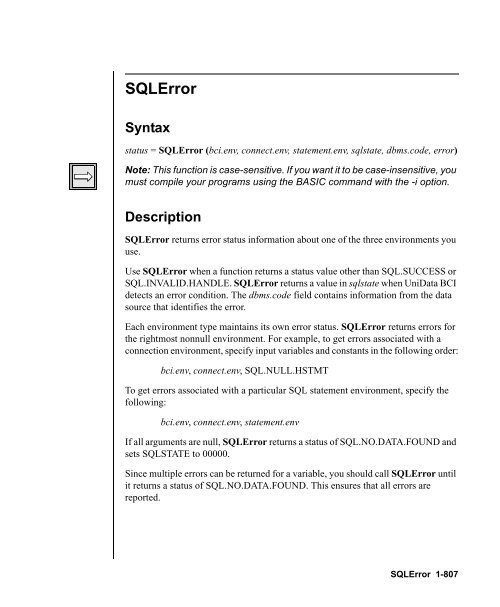UniBasic Commands Reference - Rocket Software
UniBasic Commands Reference - Rocket Software UniBasic Commands Reference - Rocket Software
Return Values The following table describes the return values of the SQLDisconnect function. 1-806 UniBasic Commands Reference Return Value Description 0 SQL.SUCCESS 1 SQL.SUCCESS.WITH.INFO −1 SQL.ERROR −2 SQL.INVALID.HANDLE SQLDisconnect Return Values
SQLError Syntax status = SQLError (bci.env, connect.env, statement.env, sqlstate, dbms.code, error) Note: This function is case-sensitive. If you want it to be case-insensitive, you must compile your programs using the BASIC command with the -i option. Description SQLError returns error status information about one of the three environments you use. Use SQLError when a function returns a status value other than SQL.SUCCESS or SQL.INVALID.HANDLE. SQLError returns a value in sqlstate when UniData BCI detects an error condition. The dbms.code field contains information from the data source that identifies the error. Each environment type maintains its own error status. SQLError returns errors for the rightmost nonnull environment. For example, to get errors associated with a connection environment, specify input variables and constants in the following order: bci.env, connect.env, SQL.NULL.HSTMT To get errors associated with a particular SQL statement environment, specify the following: bci.env, connect.env, statement.env If all arguments are null, SQLError returns a status of SQL.NO.DATA.FOUND and sets SQLSTATE to 00000. Since multiple errors can be returned for a variable, you should call SQLError until it returns a status of SQL.NO.DATA.FOUND. This ensures that all errors are reported. SQLError 1-807
- Page 798 and 799: SOAPGetResponseHeader Syntax SOAPGe
- Page 800 and 801: SOAPRequestWrite Syntax SOAPRequest
- Page 802 and 803: SOAPSetDefault Syntax SOAPSetDefaul
- Page 804 and 805: Along with SOAPSetDefault, the Call
- Page 806 and 807: Return Codes The return code indica
- Page 808 and 809: Return Codes The return code indica
- Page 810 and 811: Return Codes The return code indica
- Page 812 and 813: You can also use the UniBasic STATU
- Page 814 and 815: Return Codes The return code indica
- Page 816 and 817: SOUNDEX Syntax SOUNDEX(expr) Descri
- Page 818 and 819: SPACE Syntax SPACE(expr) Descriptio
- Page 820 and 821: SPLICE Syntax SPLICE(expr1,"expr",
- Page 822 and 823: SQLAllocConnect Syntax status = SQL
- Page 824 and 825: SQLAllocEnv Syntax status = SQLAllo
- Page 826 and 827: SQLAllocStmt Syntax status = SQLAll
- Page 828 and 829: SQLBindCol Syntax status = SQLBindC
- Page 830 and 831: SQLBindParameter Syntax status = SQ
- Page 832 and 833: Parameters The following table desc
- Page 834 and 835: SQLCancel Syntax status = SQLCancel
- Page 836 and 837: SQLColAttributes Syntax status = SQ
- Page 838 and 839: 1-796 UniBasic Commands Reference C
- Page 840 and 841: SQLColumns Syntax status = SQLColum
- Page 842 and 843: Return Values The following table d
- Page 844 and 845: Parameter Description Return Values
- Page 846 and 847: Parameter Description Return Values
- Page 850 and 851: ODBC Data Sources When a program is
- Page 852 and 853: SQLExecDirect Syntax status = SQLEx
- Page 854 and 855: Parameter Description Return Values
- Page 856 and 857: SQLExecute tells the data source to
- Page 858 and 859: Return Values The following table d
- Page 860 and 861: Return Values The following table d
- Page 862 and 863: Return Values The following table d
- Page 864 and 865: Parameters The following table desc
- Page 866 and 867: SQLGetInfo Syntax status = SQLGetIn
- Page 868 and 869: 1-826 UniBasic Commands Reference S
- Page 870 and 871: Return Values The following table l
- Page 872 and 873: Parameters The following table desc
- Page 874 and 875: 1-832 UniBasic Commands Reference C
- Page 876 and 877: SQLNumParams Syntax status = SQLNum
- Page 878 and 879: SQLNumResultCols Syntax status = SQ
- Page 880 and 881: SQLParamOptions Syntax status = SQL
- Page 882 and 883: Example This example shows how you
- Page 884 and 885: ODBC Data Sources If you execute a
- Page 886 and 887: SQLRowCount Syntax status = SQLRowC
- Page 888 and 889: SQLSetConnectOption Syntax status =
- Page 890 and 891: Return Values The following table d
- Page 892 and 893: SQLSetParam SQLSetParam is a synony
- Page 894 and 895: For complete details about the SQLS
- Page 896 and 897: 1-854 UniBasic Commands Reference C
SQLError<br />
Syntax<br />
status = SQLError (bci.env, connect.env, statement.env, sqlstate, dbms.code, error)<br />
Note: This function is case-sensitive. If you want it to be case-insensitive, you<br />
must compile your programs using the BASIC command with the -i option.<br />
Description<br />
SQLError returns error status information about one of the three environments you<br />
use.<br />
Use SQLError when a function returns a status value other than SQL.SUCCESS or<br />
SQL.INVALID.HANDLE. SQLError returns a value in sqlstate when UniData BCI<br />
detects an error condition. The dbms.code field contains information from the data<br />
source that identifies the error.<br />
Each environment type maintains its own error status. SQLError returns errors for<br />
the rightmost nonnull environment. For example, to get errors associated with a<br />
connection environment, specify input variables and constants in the following order:<br />
bci.env, connect.env, SQL.NULL.HSTMT<br />
To get errors associated with a particular SQL statement environment, specify the<br />
following:<br />
bci.env, connect.env, statement.env<br />
If all arguments are null, SQLError returns a status of SQL.NO.DATA.FOUND and<br />
sets SQLSTATE to 00000.<br />
Since multiple errors can be returned for a variable, you should call SQLError until<br />
it returns a status of SQL.NO.DATA.FOUND. This ensures that all errors are<br />
reported.<br />
SQLError 1-807



